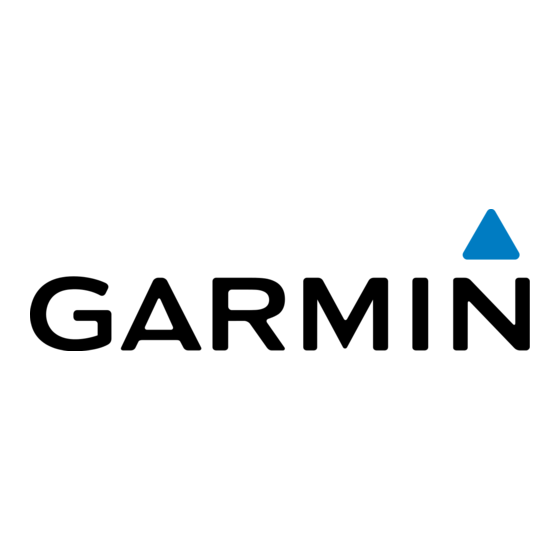Garmin GNC 420AW Aanvullende handleiding - Pagina 8
Blader online of download pdf Aanvullende handleiding voor {categorie_naam} Garmin GNC 420AW. Garmin GNC 420AW 12 pagina's. Garmin gps receiver quick reference guide
Ook voor Garmin GNC 420AW: Handleiding voor piloten Addendum (24 pagina's), Handleiding voor piloten Addendum (24 pagina's), Snelle referentiehandleiding (25 pagina's)

11. OBS Operation
SUSP after canceling OBS when on From side of OBS
path – The change in behavior is this: When you put the
400W/500W-series unit into OBS mode and the course
selected places the aircraft onto the from side and then
you cancel OBS, the OBS course is retained but the unit
indicates that sequencing is suspended by annunciating
SUSP. Note that you can still change the course to the
OBS waypoint as long as you haven't cancelled OBS, but
once you have it will annunciate SUSP. The WAAS TSO
requires the unit to annunciate when leg sequencing is
suspended, so this is the reason the SUSP annunciation
is active. The classic product behaved the same way but
did not indicate that sequencing was suspended and
when pressing the OBS key, it would return to OBS
mode on the same waypoint. With the 400W/500W-se-
ries unit, pressing the OBS key when the SUSP an-
nunciation is above it will allow leg sequencing to occur
immediately.
See the Q & A comments about using the OBS key in
Appendix C - Troubleshooting Q&A of the Pilot's Guide for
more details.
12. Hold to Altitude
The Hold to Altitude legs now use baro-corrected
altitude if it is available (similar to Fix to Altitude legs).
This means that if baro-corrected altitude is available
and the required altitude is reached for the hold, the
400W/500W-series unit will automatically unsuspend
and then sequence to the next leg after the hold fix is
crossed. If baro-corrected altitude is not available, then
the behavior is the same as the Classic – the user needs
to press OBS to sequence past the hold.
See the section on Flying an Approach with a Hold in the
Procedures chapter of the Pilot's Guide for more details.
13. Parallel Track
Parallel Track allows you to create a parallel course
offset of 1 to 99 NM to the left or right of your current
flight plan. After setting a parallel track to your current
flight plan, a magenta parallel track active leg line will be
drawn offset from the original by the selected distance.
The original course line will appear in white. The aircraft
will navigate to the parallel track course line.
Points to remember with Parallel Track:
1. You must have an active flight plan.
2. The current leg must support parallel track.
3. Parallel track is not allowed for the active leg of an
approach.
4. Parallel track is not allowed if the active leg is not a
track-to-fix or direct-to-fix leg.
5. Parallel track may be allowed but not the selected offset
distance.
6. Parallel Track offset waypoint is indicated with a "-p"
suffix.
Original waypoint
Original flight
plan course
line
After setting a parallel track to your current flight plan, a
magenta parallel track line will be drawn offset from the
original by the selected distance. The original course line
will be drawn in white. The aircraft will navigate to the
parallel track course line.
Navigating Along A Parallel Track
See the section on Parallel Track in the Flight Plan chap-
ter of the Pilot's Guide for more details.
Parallel Track offset waypoint
Present
Position
